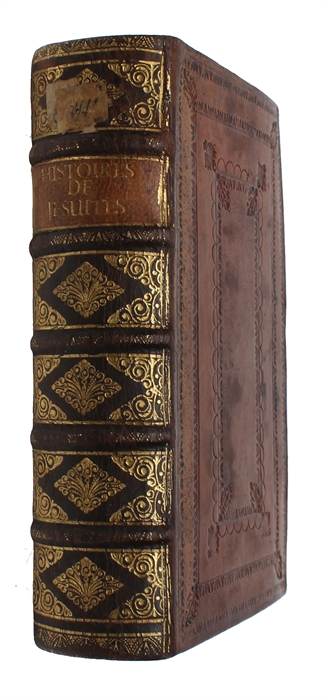TWO WORKS RELATING TO JESUITS - THE CHINESE RITES CONTROVERSY
(PETITPIED, N. & J. DE JOUVENCY.) (+) (MAIGROT, CHARLES).
Recueil de pièces touchant l'histoire de la Compagnie de Jésus, composée par J. Jouvenci, et supprimée par Arrêt du Parlement de Paris du 24 Mars 1713. Seconde édition revue, corrigée & augmentée [Petitpied] (+) Examen des faussetez sur les cultes chinois avancées par le P. Joseph, Jésuite, dans l'Histoire de la Compagnie de Jésus. Traduit d'un écrit latin composé par le R. P. Minorelli [Maigrot].
A Liege, 1716 (Petitpied) & 1714 (Maigrot).
8vo. In a very nice Cambridge-style mirror binding with five raised bands and richly gilt spine. Small paper-label pasted on to top of spine. Back board with scracth with loss of leather. Edge of back board with small tear showing the wooden board. Front free end-paper with a few annotation, otherwise a nice and clean copy. XXI, (1), 539 pp. + folded plate; (8), 184 pp.
Highly interesting sammelband consisting of two works, both relating to Jesuit affairs and rarely found in the trade: 2 - First edition of Maigrot’s critique of Jouvency’s view on Chinese religion namely that of the The Chinese rites controversy (c.1582–1742), which wasc a religious quarrel between different Catholic orders over whether it was permissible for Chinese converts to observe traditional rites and use the Chinese terms tian and shangdi to refer to the Christian God. “Rites Controversy debate was most intense in Fujian province where an active group of Christian literati debated with a combative Catholic bishop named Charles Maigrot de Crissey (1652–1730).European missionaries divided largely on the lines of religious orders and nationalities.The Jesuits largely supported the Chinese while the Iberian mendicants (Dominicans and Franciscans) and secular priests were less accommodating. Bishop Maigrot was born and educated in Paris and joined the Society of Foreign Missions of Paris whose missionaries competed with the Jesuits in East Asia.Although Maigrot was resistant to any change in European Christianity,he realized the practical need to study the Chinese language and culture with the assistance of two low-level Chinese literati.Although his linguistic facility remained quite limited,it gave him a false confidence in his knowledge that would eventually cause him great embarrassment. In his interpretation of the Chinese rites,Maigrot relied on the writings of a treatise written by the Dominican missionary Francisco Varo in 1672.Varo took a hard line in prohibiting Chinese Christians from performing ceremonies in honor of their ancestors and Confucius.The Christian literatus Yan Mo (baptized Paul) responded with an essay “Distinguishing Different Forms of Sacrifice” (Bianji) that defended the practice of Christians honoring their ancestors and Confucius.Yan argued that the word for sacrifice (ji) was ambiguous and that it meant different things when it was applied to sacrifices for ancestors, the ancient sages,primary teachers,and the Christian God.He emphasized that one needed to carefully distinguish the internal meaning from the outward ritual because the meaning of “sacrifice”varied with each case.” (Mungello, The Great Encounter of China and the West, 1500-1800)
1 - The second edition of Jouvency’s ‘Histoire de la Compagnie de Jésus’, which was condemned immediately after its publication in 1710 (here all the condemned parts are included) because of its critique of seqular rulers.
Order-nr.: 60836


![Recueil de pièces touchant l'histoire de la Compagnie de Jésus, composée par J. Jouvenci, et supprimée par Arrêt du Parlement de Paris du 24 Mars 1713. Seconde édition revue, corrigée & augmentée [Petitpied] (+) Examen des faussetez sur les cultes ...](/images/product/60836b.jpg)
![Recueil de pièces touchant l'histoire de la Compagnie de Jésus, composée par J. Jouvenci, et supprimée par Arrêt du Parlement de Paris du 24 Mars 1713. Seconde édition revue, corrigée & augmentée [Petitpied] (+) Examen des faussetez sur les cultes ...](/images/product/60836c.jpg)
![Recueil de pièces touchant l'histoire de la Compagnie de Jésus, composée par J. Jouvenci, et supprimée par Arrêt du Parlement de Paris du 24 Mars 1713. Seconde édition revue, corrigée & augmentée [Petitpied] (+) Examen des faussetez sur les cultes ...](/images/product/60836d.jpg)
![Recueil de pièces touchant l'histoire de la Compagnie de Jésus, composée par J. Jouvenci, et supprimée par Arrêt du Parlement de Paris du 24 Mars 1713. Seconde édition revue, corrigée & augmentée [Petitpied] (+) Examen des faussetez sur les cultes ...](/images/product/60836e.jpg)
![Recueil de pièces touchant l'histoire de la Compagnie de Jésus, composée par J. Jouvenci, et supprimée par Arrêt du Parlement de Paris du 24 Mars 1713. Seconde édition revue, corrigée & augmentée [Petitpied] (+) Examen des faussetez sur les cultes ...](/images/product/60836f.jpg)
![Recueil de pièces touchant l'histoire de la Compagnie de Jésus, composée par J. Jouvenci, et supprimée par Arrêt du Parlement de Paris du 24 Mars 1713. Seconde édition revue, corrigée & augmentée [Petitpied] (+) Examen des faussetez sur les cultes ...](/images/product/60836g.jpg)